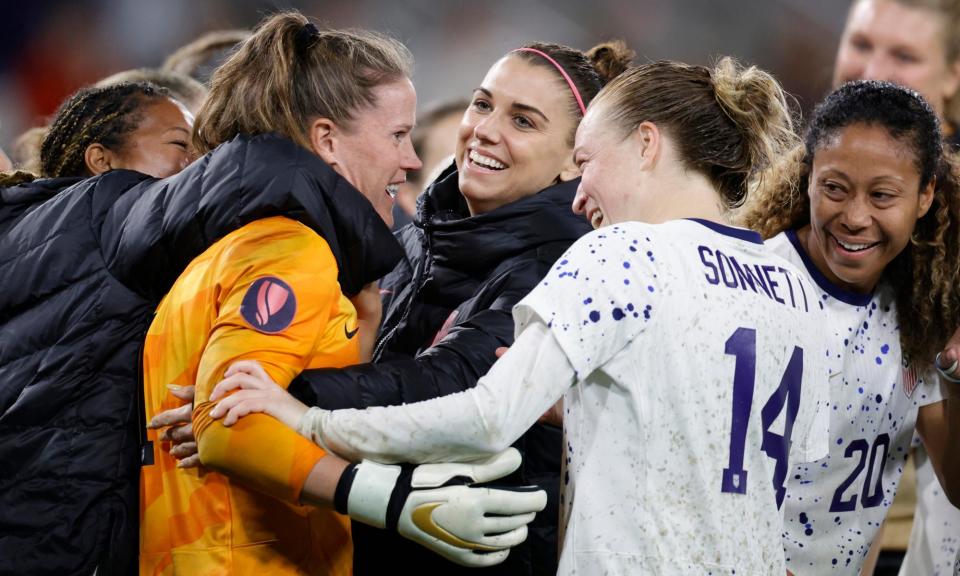Naeher the hero as USA hold off Canada in rain-soaked W Gold Cup semi-final

Alyssa Naeher made three saves in the penalty shootout after a rain-soaked 2-2 draw with Canada on Wednesday night, earning the United States a spot in the Concacaf W Gold Cup final.
Related: Canada v USA: Concacaf W Gold Cup semi-final – live
The United States advanced 3-1 on penalties and will play Brazil in the final on Sunday evening. Brazil defeated Mexico 3-0 in the earlier semi-final match.
The game was a sloppy mess with standing water on the field at San Diego’s Snapdragon Stadium from heavy rain in San Diego and the players had difficulty with control. Canada’s Vanessa Gilles twisted the front of her soaked jersey to squeeze out some of the rainwater.
Jaedyn Shaw scored in the 20th minute making her the first US player to score in each of her first four starts. A Canada defender tried to send the ball back to goalkeeper Kailen Sheridan, but it stopped on the waterlogged field and Shaw ran up on it and scored. Jordyn Huitema tied it up in the 82nd minute with a header that was beyond the US goalkeeper Naeher’s reach.
Sophia Smith broke the stalemate in the 99th minute, falling to her knees in celebration before she was mobbed by her teammates. But minutes later Naeher collided with Gilles and Canada were awarded a penalty, which Adriana Leon calmly converted to take it to penalties.
Naeher had two saves to open the shootout, and then converted on a penalty of her own. She stopped Jesse Fleming with a final save to send the United States to the title match.
ALYSSA NAEHER CAN SAVE AND CONVERT PENALTIES 🤯 pic.twitter.com/vewrwXwto5
— Attacking Third (@AttackingThird) March 7, 2024
“Being able to adjust to any sort of conditions is always a part of it and it takes a certain mentality to do that,” Kilgore said. “We did that today and we’re not going to shy away from celebrating that because it’s not easy.”
The former US midfielder Sam Mewis was among the most vocal critics of the decision to play the game despite torrential downpours in the run-up that left the deep puddles of water all over the pitch.
“Why are the players being put in this situation?” Mewis wrote on X, formerly known as Twitter. “No chance these are safe playing conditions.”
Why are the players being put in this situation? No chance these are safe playing conditions.
— Samantha Mewis (@sammymewy) March 7, 2024
With Brazil’s victory, the United States were denied a revenge match against Mexico, who pulled off the biggest upset of the group stage in downing the United States 2-0. It was just the second time the Americans had lost to their southern neighbors in 43 meetings.
The United States rebounded from that loss with a 3-0 victory over Colombia in the quarter-finals. Canada, who scored 13 goals in their group without conceding a goal, got by Costa Rica 1-0 in extra time in their quarter-final match. It was the 14th time that the United States have faced Canada in the knockout round of a competitive tournament. The US have won 11 of the previous 13 meetings. Canada’s lone win came in the semi-finals of the Tokyo Olympics.
It was Canada’s first major tournament without their former captain Christine Sinclair, who retired from the national team last year as soccer’s all-time leading goal scorer among men or women with 190 career goals.
Mexico went on to eliminate Paraguay 3-2 in the quarter-finals. Brazil routed Argentina 5-1. In their semi-final, Brazil got goals from Adriana, Antônia and Yasmim, while Mexico were a player down after Nicolette Hernández was sent off in the 29th minute.
The tournament was the first women’s Gold Cup, designed to give teams in the region meaningful competition. Four of the teams that participated – the United States, Canada, Brazil and Colombia – will play in this summer’s Olympics.

